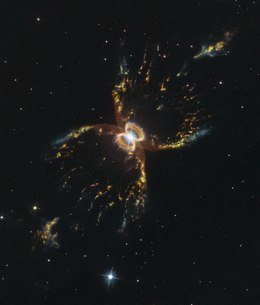Southern Crab Nebula
| Emission nebula | |
|---|---|
| Planetary nebula | |
 | |
| Observation data: J2000 epoch | |
| Right ascension | 14h 11m 52.06s[2] |
| Declination | −51° 26′ 24.1″[2] |
| Distance | 7,000 ly (2,100 pc)[3] ly |
| Apparent magnitude (V) | 14.20[2] |
| Constellation | Centaurus |
| Notable features | Has a symbiotic star system at its center |
| Designations | V852 Cen, Hen 2-104, IRAS 14085-5112, PN G315.4+09.4, Wray 16-147, 2MASS J14115206-5126241 |
The Southern Crab Nebula (or WRAY 16-147 or Hen 2-104) is a nebula in the constellation Centaurus. The nebula is several thousand light years from Earth, and its central star is a symbiotic Mira variable - white dwarf pair. It is named for its resemblance to the Crab Nebula, which is in the northern sky.
The Southern Crab was noted in a 1967 catalog, and was also observed using a CCD imager with the 2.2 meter telescope at the La Sila observatory in 1989.[4] The 1989 observation marked a major expansion of knowledge about the nebula, and it was observed using various filters.[4]
The nebula had already been observed using Earth-based telescopes,[4] but images taken with the Hubble Space Telescope in 1999 have provided much more detail, revealing that at the center of the nebula are a pair of stars, a red giant and a white dwarf. It was imaged again by HST in 2019 with a newer instrument.
In 1999 it was imaged by the Hubble Space Telescope's Wide Field and Planetary Camera 2,[5] noted for its unique "stair-step" crop and for such astrophotos as the Pillars of Creation.
The WFPC2 images were taken at an optical light wavelength of 658 nm.[5]
The nebula was imaged again by the Hubble Space Telescope in 2019, and a set of images to celebrate the anniversary of the space telescope's launch in 1990 (29 years) by the Space Shuttle.[6] This time a newer camera the WFC3 was used to image the nebula, at wavelengths filters of about 502, 656, 658, and 673 nanometers.[7]
The designation He2-104 (or Hen 2-104) comes from the Henize catalog of 1967, Observations of Southern Planetary Nebulae.[8] The catalog includes 459 items identified as planetary nebula (or likely as such).[9] (note that in this meaning it does not imply exoplanets)
Another designation that it has been recorded for this object is WRAY-16-47.[10]
In 2008, an investigation of the Southern Crab with its symbiotic (astronomical term) star was published.[11] The study used imaging and spectroscopic data from space and Earth-surface telescopes including Hubble and VLT observatories.[11] The ESO defines a symbiotic star system as "binaries in which a small hot star (white dwarf or main sequence star) orbits around a red giant star. These systems are often surrounded by an envelope of gas or dust; those with gas are known as S-types and those with dust as D-types."[12]
Gallery[edit]
-
Close up of the center of the Nebula
-
The Southern Crab Nebula in its entirety
-
Southern Crab Nebula – (18 April 2019;annotated)
-
Southern Crab Nebula – (18 April 2019;Shape)
See also[edit]
References[edit]
- ^ "Hubble Celebrates its 29th Birthday with Unrivaled View of the Southern Crab Nebula". www.spacetelescope.org. Retrieved 18 April 2019.
- ^ a b c "Hen 2-104". SIMBAD. Centre de données astronomiques de Strasbourg.
- ^ "The Southern Crab Nebula, a planetary nebula in Centaurus". Anne's Astronomy News. 18 November 2012. Retrieved 22 January 2017.
- ^ a b c Chiu, Liang-Tai George (August 1980). "Space Telescope Astrometry from CCD images". Celestial Mechanics. 22 (2): 191–196. doi:10.1007/bf01228806. ISSN 0008-8714. S2CID 121065447.
- ^ a b "Southern Crab Nebula". www.spacetelescope.org. Retrieved 2019-09-17.
- ^ Hille, Karl (2019-04-18). "Hubble Celebrates 29th Anniversary with the Southern Crab Nebula". NASA. Retrieved 2019-09-17.
- ^ "The Crab of the Southern Sky". www.spacetelescope.org. Retrieved 2019-09-17.
- ^ "List of Common Deep Sky Catalogs". www.messier.seds.org. Retrieved 2019-09-17.
- ^ Henize, Karl G. (April 1967). "Observations of Southern Planetary Nebulae". The Astrophysical Journal Supplement Series. 14: 125. Bibcode:1967ApJS...14..125H. doi:10.1086/190151.[permanent dead link]
- ^ 15677 - Spectroscopy and Imaging of the Southern Crab Nebul
- ^ a b "Hen 2-104: A close-up look at the Southern Crab". ResearchGate. Retrieved 2019-09-18.
- ^ "The "Southern Crab" Nebula". www.eso.org. Retrieved 2019-09-18.
External links[edit]
- The "Southern Crab" Nebula (He2-104) in 1989 Archived 2021-11-08 at the Wayback Machine (captures the crab like presentation)




